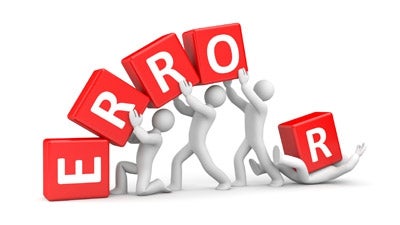
It’s often mistaken for your logo, your products, or service. But branding is much more than that. It’s entwined with every aspect of your business, whether you realize it or not.
Even if you’re not consciously working on your brand image, you still have one. It’s your customers’ and potential customers’ perception of you, whether good or bad.
If you aren’t actively promoting your brand or your image, it’s important that you also don’t make a mistake that can ruin your business. And if you are actively working on how your potential customers perceive you, you absolutely must pay attention to mistakes that could torpedo your efforts!
Branding is Essential—Because You Are Your Brand
Unfortunately, many small start-ups assume branding is just a big business issue. Big brand names like McDonalds, Marlboro, Levi’s and Nike all conjure an image in your head. Global brands have huge management teams that oversee every aspect of their brand’s image. They want you to connect their brand name with something positive so you’ll buy their product.
For smaller start-ups, brand management may seem like something you’ll do someday, which is a vague date in the future after you’ve established your business. But the biggest online branding mistake you can make is not realizing that branding starts on day one. And if you’re an entrepreneur, you essentially are your brand. Everything you do and say, plus every piece of content you publish, is a representation of your brand.
Brand management is not just for businesses, but all entrepreneurs. Chris Guillebeau, Pat Flynn, Jeff Goins, and Jenny Blake have all grown their personal brands into thriving businesses. These are great examples of “you are your brand.” They know their brand image is their bread and butter. They leverage their reputation to grow their business, and they understand they must project a certain image to increase the success of their brand.
Branding mistakes can kill your new business, or certainly damage it if you don’t understand the important role branding plays. To build a professional brand for your start-up, avoid theses common online branding mistakes.
Mistake #1: Clipart Logo
One of the biggest misconceptions is thinking that your brand is the same thing as your logo. Branding isn’t your logo—it’s the perception behind your logo. It should be professional, not a common stock image.
Many small start-ups can’t afford to hire a graphic designer. So they simply use a random clipart picture for their logo. Never use a common clipart pic to visually represent your brand. It’s not special if everyone can use it. Instead, use your business name in simple letters until you can afford the real thing.
Mistake #2: No Website
In this day and age, there is no excuse for not having a website. Google receives over 2 million queries per minute! Customers expect businesses to have a website. Without a website, your business simply seems like a hobby or side job.
Some new businesses turn to Facebook or Twitter as a cheap alternative to a website. But this isn’t enough to showcase your business. Thankfully, there are free and affordable options to build a strong web presence. For example, you can create free websites at Wix and Yola. These simple platforms can give you a professional brand image, without investing a lot of money.
You can also create free ecommerce stores with Selz and Square. If you have a product or service to sell, these sites allow you to create a professional looking website for free. They simply charge a small percentage of the sale. These sites are easy to use and you don’t need any special technical skills. It’s a great way to showcase your brand’s image while increasing online sales.
Mistake #3: Inconsistent Messaging
Your brand’s message is any post, tweet, status update, advertisement, business card or press release. It’s every piece of content you publish about your business.Your brand message should represent the core values of your business. For example, hardworking, dedicated, professional, or expertise—whatever message you want to convey the most.
This doesn’t mean that you simply copy the same message into every piece of content. Rather, it means the intent of every message should be aligned. If your brand’s core value is sustainability and social responsibility, then every new message should reflect these ideals. Lush and The Body Shop are two great examples of consistent messaging across all platforms.
Mistake #4: Controversial Social Media Use
Love it or hate it, social media is here to stay. It can be a great way to showcase a brand, or it can be a nightmare. Many major brands have fallen prey to inappropriate social media use, including recent blunders by Royal Dutch Airlines and Home Depot.
For new start-ups, the lesson is clear—it’s okay to use social media as long as it sticks with your brand’s core values. These are probably not the same as your personal values. Controversial issues spread like wildfire on the Internet, including same-sex marriage, medical marijuana, or supporting a specific political party. These are all polarizing issues that can have a direct impact on your brand’s image.
Before proclaiming your personal views on social media, be aware that you could damage your brand’s image. You are connected directly to your brand’s image. Before you hit send, be sure it’s an issue you’re willing to lose customers over.
Mistake #5: Unprofessional Business Practices
Everyone has run into unprofessional business practices: not returning phone calls, showing up late to meetings, or ignoring problems. It can be annoying and frustrating, and can make customers run to your closest competitor.
All businesses are different. But there is always some type of transaction between the business and customer. Every step, from the first inquiry to any follow-up services, should be professional. Return emails and phone calls in a timely manner. Promptly address any problems or mistakes. Take responsibility and try to correct any adverse situation to the best of your ability.
This last point is especially important when you’re just starting out. You’re going to make mistakes—everyone does. The difference is in how you acknowledge and address them. You want your start-up to be perceived as valuable and credible. Not as a brand that is synonymous with unprofessional, time-wasting, or egomaniacal.
Manage Your Brand From Day One!
Having a strong, professional business brand is essential to the success of your new start-up. You could leave it up to chance, and let your brand image grow by itself. But that’s a crapshoot.
Instead, start managing your brand image from day one. Consciously create the brand you want to project. Don’t fall prey to common online branding mistakes, but make choices every day that help grow your business into the brand you want to become.
Branding is perception and reputation. Start with listing what values are most important to you. Create a set of unbreakable rules that guide your business. And never forget that you are your brand image.
Make sure it’s an image that will help grow your start-up, not damage it.
Have you made any online branding mistakes? Or, have you experienced any from a customer perspective? Let me know in the comments section.
This article was originally published by Firepole Marketing
Author: Liesha Petrovich is the creator of Micro Business Essentials, a unique business blog exclusively for micro businesses. If you’re looking for fast, affordable, and effective tips to help your business grow, click here to grab a copy of Micro Business Essentials Toolkit: Free and Low Cost Resources. And follow her on Twitter (@lieshepetrovich) and Google +.
3226 Views












